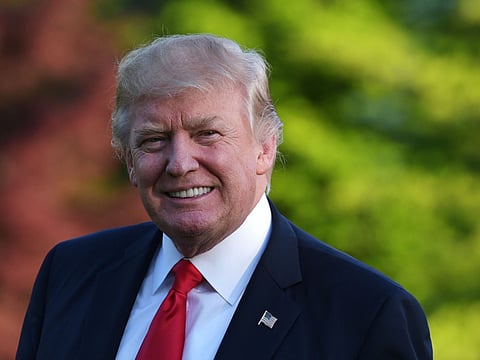What is the Trump Doctrine?
An ill-defined principle tested in Syria with dire consequences

For murky reasons, contemporary American presidents associate their last names with “doctrines” that, to say the least, are meant to secure their spots in global history. Donald Trump may not have devised his yet, either in terms of strategy or even for purely financial reasons — the former US Secretary of Labour Robert Reich defined it as it being “firmly rooted either in making money for Trump, or stopping bad people from doing bad things” — but one is coming, and sooner than most of us contemplate.
Unlike the Obama Doctrine, which the former president defined in a 2015 interview with the New York Times as engagement that would allow Washington to preserve all its capabilities [a confused formulation that defined his administration], serious thinkers are now rushing to devise their understandings of the current regime’s vision.
Anne-Marie Slaughter, a renowned academic envisaged the Trump doctrine as a declaration that will see the US “make every effort to resolve international problems through diplomacy, but in cases involving the proliferation or use of weapons of mass destruction, [it] is prepared to act with the support of only a plurality of Security Council members.”
Zalmay Khalilzad, former ambassador in Afghanistan, Iraq and the UN, opined that the new doctrine called “for a break from the status quo on at least five main issues: US goals, countering the terrorist group [Daesh — the self-proclaimed Islamic State of Iraq and the Levant] and Islamist extremism, democracy promotion, immigration and great-power relations”, all of which required toughness according to the affable reviewer.
Critical commentators, like CNN Editor-at-Large Chris Cillizza, concluded that “what makes Trump unique is that he appears to be primarily defining what he believes in reaction to the positions staked out by Obama. If Obama was for it, Trump is against it — and vice versa”.
The historian Max Boot defined the Trump Doctrine as “the right to use force whenever the president is upset by something he sees on TV”.
Indeed, Trump decided to launch 59 Tomahawk cruise missiles at the Shayrat Air Base (SAB) near the city of Homs in retaliation for Syrian President Bashar Al Assad regime’s alleged use of chemical weapons to slaughter dozens of civilians in the town of Khan Shaikhoun. Trump was dismayed all right and called Al Assad an “animal”.
Russia objected and even doubted the combat effectiveness of the attack — claiming that only 23 missiles apparently hit the SAB even if crack Moscow analysts could not account where the other 36 landed — while Washington affirmed that “approximately 20 planes, hardened aircraft shelters, petroleum and logistical storage, ammunition supply bunkers, defence systems, and radars” were destroyed.
The Pentagon published aerial photos to back its assertions and for everyone to see for themselves.
Surprisingly, the Iranian reaction was muted, as Foreign Minister Mohammad Javad Zarif called for an impartial investigation and questioned the claim that the Syrian government was behind it. President Hassan Rouhani condemned the use of chemical weapons but added that attacking the Syrian government “strengthens regional extremism and terror”, while Supreme Leader Ayatollah Ali Khamenei opted to criticise European leaders rather than the US.
Israel praised Trump even if most officials there were sceptical, because they concluded that the American harbours a “desire to prove that he is stronger than his predecessor”. Still, Israeli Defence Minister Avigdor Lieberman maintained that President Al Assad had personally authorised the use of sarin gas in the attack, while Prime Minister Benjamin Netanyahu called on the “international community to complete its effort to eliminate Syria’s chemical weapons stockpile”.
Lieberman’s public comments apparently irritated the Kremlin, which prompted President Vladimir Putin to get on the telephone and complain to Netanyahu who, local papers reported, was especially attentive to Putin’s views. The two men met five times during the past 18 months and, by all accounts, shared common interests in Syria as they both supported the Damascus regime.
Whether they now disagreed was impossible to verify, though few should be surprised that Russia is irritated by recent Israeli air attacks inside Syria. These picked up pace during the past year, as Netanyahu unleashed his air force against weapons depots and convoys that attempted to transfer chemical weapons or sophisticated weapons systems from Iran to Hezbollah (in Lebanon), via Syria.
Moscow is equally upset with Washington and seems to have its own difficulties with Trump who, while tolerant of a Russian military role in Syria is, nevertheless, determined to deny the Iranian Revolutionary Guard Corps an increased presence in the Levant.
Which brings us back to the formulation of a new embryonic canon. Unlike most American presidents, Trump is unpredictable and is offended by the slightest insult, which will create immense challenges. His doctrine, if and when one crystallises, will be likely erratic as well, with world leaders unsure when the American president will sidestep diplomacy to launch military attacks.
Its application in the Middle East, or so it appears at this early juncture, aims to block an Iranian resurgence, prevent the latter’s proxy forces from gaining traction, and a weakening of the Al Assad regime — all of which are bound to increase the opportunities for military confrontation.
Dr. Joseph Kechichian is the author of the just published The Attempt to Uproot Sunni Arab Influence: A Geo-Strategic Analysis of the Western, Israeli and Iranian Quest for Domination (Sussex: 2017).


